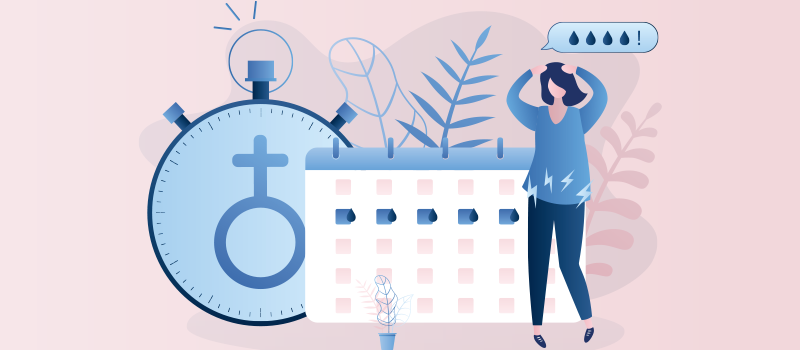What’s the Buzz
The Bee Healthy Blog
How Long Does Menopause Last? Symptoms & Treatments

Menopause is when you stop getting your menstrual cycles. It is a normal and natural event that occurs due to falling levels of reproductive hormones. You are considered postmenopausal when your last menstrual period was at least 12 months ago. The menopausal transition can cause a range of uncomfortable symptoms. Please continue reading to learn about the common symptoms of menopause and their treatments.
When does menopause happen?
The average age when menopause occurs is 51 in the United States. But the menopause transition can happen anytime in the 40s or 50s. If menopause begins before age 40, it is called premature menopause and is not considered normal. If it occurs between the ages of 40 and 45, it is called early menopause.
What happens to the menstrual cycle during menopause?
It is common to skip periods during perimenopause (the time period leading up to menopause). You may not have a menstrual period for one month or several months and then start monthly menstrual cycles again for a few months. Your menstrual flow may be lighter and your cycles may be shorter, occurring closer together. However, despite irregular periods and somewhat erratic vaginal bleeding, it is still possible for you to become pregnant during perimenopause, so you should use birth control to prevent pregnancy. Also, menopause does not protect you from sexually transmitted diseases, so you should continue to take precautions.
What are menopause symptoms?
Perimenopausal symptoms occur in the first stage of the menopausal transition. They happen due to declining ovarian function and falling hormone levels. The perimenopausal stage can last for up to 10 years before you enter menopause and stop having your menstrual periods.
As estrogen levels decline, you may experience severe hot flashes and night sweats - these are called menopausal vasomotor symptoms. Many women also experience other symptoms due to hormonal changes, such as irregular menstrual flow and shorter monthly cycles, vaginal dryness, vaginal atrophy, decreased fullness of the breasts, weight gain, mood swings, joint pain, thinning hair, dry skin, sleep problems, urinary incontinence, low libido, and pain or vaginal bleeding during sexual intercourse.
When do menopause symptoms get better?
Once you are in menopause or postmenopause, i.e., you have not had a menstrual period for 12 months, the uncomfortable symptoms should start to get better. However, falling estrogen levels can increase your risk of blood clots, cardiovascular disease, and osteoporosis (a decrease in bone density).
How long does menopause last?
How long symptoms of menopause last varies from woman to woman. Generally speaking, women’s health experts say the symptoms last for 7-10 years from the time you enter perimenopause, i.e. when estrogen levels begin falling.
Do the symptoms of menopause ever go away?
Yes, postmenopause symptoms typically get milder or disappear after you have not had a menstrual period for 12 months. Your healthcare provider can prescribe treatments to help relieve symptoms in the meantime.
What is the best way to treat menopause symptoms?
The best way to treat menopause symptoms depends on the symptoms. For example, if your menopausal symptoms are mainly hot flashes, your healthcare provider can prescribe medications to provide relief from hot flashes. If you have vaginal dryness, a vaginal lubricant may help. Here are some of the treatments available to women with perimenopausal symptoms.
Topical hormone therapy
Postmenopausal women with vaginal dryness may benefit from the direct application of estrogen to the vagina in the form of a cream, ring, or tablet. The estrogen supports the vaginal tissues and helps to relieve vaginal dryness, painful sex, and urinary symptoms.
Vaginal lubricants
A vaginal lubricant such as Replens or K-Y Liquibeads can relieve vaginal dryness and relieve discomfort during sexual intercourse.
Strengthening exercises for pelvic floor muscles
Urinary symptoms like urgency, frequency, and incontinence are common when women enter perimenopause. Your healthcare provider or physical therapist can teach you Kegel exercises for menopause that help to strengthen the pelvic floor muscles and relieve urinary symptoms.
Hormone replacement therapy
Hormonal therapy consists of replacing estrogen and progestin hormone levels to relieve menopausal symptoms like hot flashes and prevent bone loss. However, long-term use of hormone replacement therapy is associated with an increased risk of cardiovascular disease and breast cancer. Your doctor will prescribe hormone therapy at the lowest dose and for the shortest time to relieve symptoms and improve your quality of daily life.
Medications to treat hot flashes
Anti-seizure medications like gabapentin (Neurontin, Horizant, Gralise) can provide relief from hot flashes and night sweats. Blood pressure medications like clonidine (Catapres, Kapvay) are available as a pill or patch and can also reduce hot flashes. Additionally, a low-dose antidepressant, for example, selective serotonin reuptake inhibitors (SSRIs) like Prozac, Lexapro, Celexa, Zoloft, or Paxil, can help in managing menopausal hot flashes, mood changes, and trouble sleeping. These drugs are a good option for women who don’t want to use estrogen replacement hormonal therapy.
Medications to prevent or treat osteoporosis
Menopause is associated with a reduction in bone density and an increased risk of fractures (osteoporosis). Your healthcare provider may prescribe a medication to strengthen your bones, prevent or treat bone loss, and lower your risk of fractures. This may include calcium and vitamin D supplements and/or a group of drugs called bisphosphonates (for example, alendronate, risedronate, ibandronate, and zoledronic acid).
How do you treat menopausal symptoms at age 50?
You treat menopause symptoms at age 50 like you treat symptoms at other ages. In addition to the above, a healthy lifestyle including a nutritious diet and regular exercise are important to manage symptoms when the body begins to go through the “change of life.” A healthy diet also prevents other health conditions like diabetes and heart disease. It’s also important to keep up with regular doctor visits and pelvic exams in the perimenopausal stage.
References:












SOCIAL